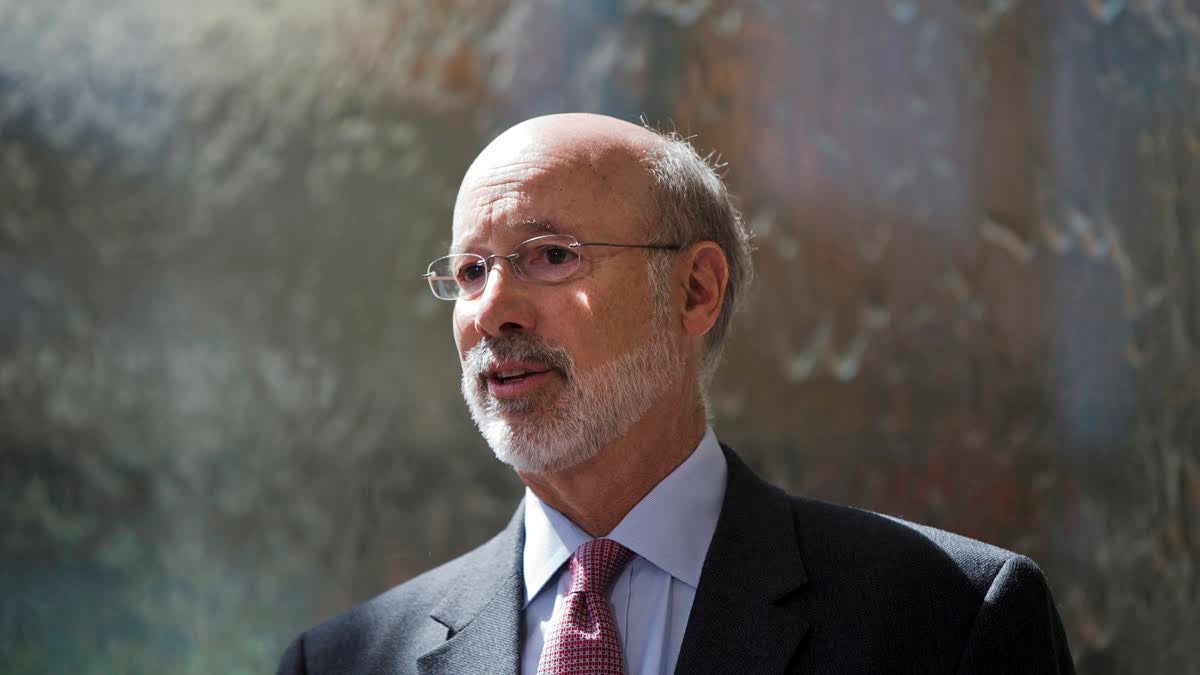Ahead of budget deadline, Wolf scales back education funding ask

Pennsylvania Gov. Tom Wolf speaks during a news conference in Philadelphia on June 2
And takes broad-based tax hikes off the table.
Pennsylvania governor Tom Wolf says he now believes a 2016-17 budget deal can be reached without hiking state sales or income taxes.
This comes as Wolf scales back his public education funding proposals.
Wolf made this statement Tuesday morning on KDKA, a commercial radio station in Pittsburgh:
“We need a balanced budget that is truly balanced. I want $250 million dollars for basic education, an increase, and I want $34 million dollars for the heroin overdose problem, which is really a big problem in Pennsylvania. And I think all this can be done without a broad-based tax increase.”
Wolf had been seeking $350 million in basic education funding this year — $100 million more than what he’s now asking for the state’s main pot of public school cash.
In his first budget proposal in March 2015, he called for a $2 billion boost to all K-12 budget lines over four years.
If this new proposal goes through, Wolf would end year two only about a quarter of the way towards that goal.
“We still have a long way to go,” said Wolf spokesman Jeffrey Sheridan in a telephone interview. “But we are working with a legislature that is controlled by a different party, and we’re trying to find common ground and reach compromise with them.”
The Campaign for Fair Education Funding, which is a coalition of over 50 advocacy groups, has been calling for the state to increase basic education funding by $400 million annually for 8 years.
Gov. Tom Wolf says that’s not politically possible. After a historically long budget battle last year, the state boosted total basic, special and block grant education funding by $245 million.
Spokesman Charlie Lyons says his members are not disappointed by Wolf.
“I think people recognize that he’s pushing, but that’s not to say that we don’t think there needs to be more,” he said.
Wolf had asked for broad-based tax hikes in each of his first two budget proposals.
As part of a grand bargain that included revising the state pension system, there seemed to be consensus in the Republican-controlled Senate for such a tax hike in December.
But that bargain fell apart without support of leaders in the House.
Two of the additional sources of revenue now being considered are the proceeds from expanding gaming, and those from hiking the state’s cigarette tax.
Senate Republican spokeswoman Jennifer Kocher praised Wolf for backing away from proposals to hike sales or income taxes.
“We are happy the governor came to the realization that we cannot turn to taxpayers first when it comes to balancing the budget,” she said.
Below is a brief history of Wolf’s K-12 public education funding proposals and results thus far:
March 3, 2015
Wolf’s first budget address calls for:
$400M increase to basic education subsidy
$100M increase to special education subsidy
And he proposes to boost total K-12 spending by $2 billion over four years.
December 29, 2015
Wolf announces line-item veto on a Republican-backed spending plan as budget reaches its sixth month overdue.
Within this line-item veto, Wolf disperses:
$50 million increase in block grant funding that he distributes using his own unilateral “restoration” formula
$30 million increase in special education funding
February 2, 2016
With 2015-16 budget negotiations still in flux, Wolf gives his 2016-17 budget address.
He calls for a $200 million increase to basic education funding in the 2016-17 budget, and says he’s still hoping the 2015-16 deal will settle with a $377 million increase.
In total, Wolf is seeking $577 million.
March 23, 2016
Wolf says he’ll allow a 2015-16 budget to become law that brings an additional $150 million increase in basic education funding. Wilkinsburg SD and Chester-Upland SD received special supplements totaling $15 million.
In total, between this boost, the $50 million block grant boost and the $30 million special ed boost in December, that’s $245 million secured in Wolf’s first year for K-12 education.
To keep pace with his call for $2 billion to K-12 over four years, the funding would need to be more than double that.
After the dust settled on the 2015-16 deal, Wolf revised his 2016-17 ask.
He called for $350 million to basic education and $50 million to special education.
June 21, 2016
In an interview with a Pittsburgh radio station, Wolf revised these numbers downward.
He now seeks $250 million in basic ed and $30 million in special ed.
Wolf says he believes these figures can be reached while also bringing the entire state budget into balance without a broad-based tax increase.
If Wolf’s current proposals pan out, the total two year boost to K-12 would be $525 million, about half of where it would need to be to meet his original $2 billion first-term goal.
WHYY is your source for fact-based, in-depth journalism and information. As a nonprofit organization, we rely on financial support from readers like you. Please give today.



